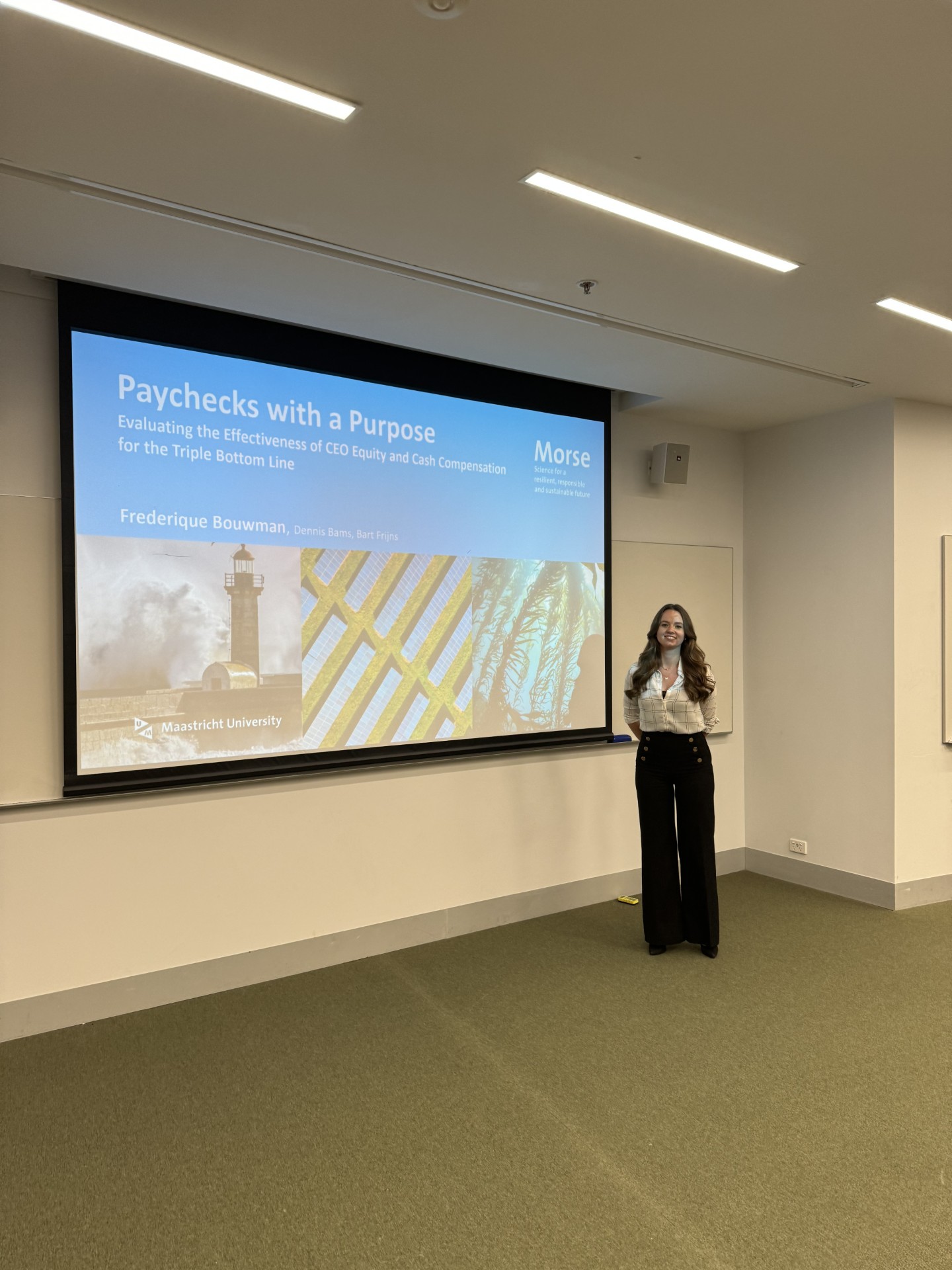Can Paychecks Drive Purpose?
In today’s business world, companies are under increasing pressure to embrace environmental and social responsibility, not just as an act of goodwill but as a fundamental business strategy. Yet, while corporate sustainability goals are plastered across glossy annual reports, what drives the leaders behind these decisions? If money talks, what story does it tell about purpose? Can the way CEOs are paid help shape a more sustainable future? This is the question I explore, together with my co-authors Dennis Bams and Bart Frijns in the paper “Paychecks with a Purpose: Evaluating the Effectiveness of CEO Equity and Cash Compensation for the Triple Bottom Line.” Last week, I had the opportunity to present this paper at the largest Finance conference of Australia, the Australian Finance & Banking Conference hosted at the University of New South Wales.
Sustainability at the Top: Why CEO Pay Matters
Corporate sustainability is more than a trend; it’s a critical response to global challenges like climate change, resource scarcity, and growing societal inequality. CEOs, as the ultimate decision-makers, have a unique role in steering their companies toward meaningful action. Incentives, particularly financial ones, heavily influence the behavior of corporate leaders. This makes CEO compensation packages not just a perk of leadership but a lever of change. The paper investigates whether the structure of CEO pay, in particular cash versus equity, affects a company’s commitment to environmental and social goals. At its core, it asks: Do these pay structures help CEOs make decisions that prioritize sustainability? Or do they inadvertently encourage short-termism and symbolic actions that look good but deliver little real impact? Understanding this dynamic is essential. If sustainability initiatives are shaped by incentives, aligning CEO pay with genuine impact rather than optics could transform how businesses tackle global issues. This insight forces us to rethink what “pay for performance” should mean in an era where corporate purpose is just as important as profit.
Equity Compensation: The Double-Edged Sword
Equity compensation, where CEOs are rewarded with stock options or shares in their companies, has grown in popularity over the past few decades. The idea is straightforward: align the CEO’s interests with shareholders by tying their financial success to the company’s stock performance. On paper, this seems like a brilliant solution to motivate CEOs to drive growth and create value. But when it comes to sustainability, the picture gets more complicated. Our research shows that equity compensation often encourages symbolic sustainability efforts rather than substantive ones. CEOs are drawn to actions that boost their company’s ESG ratings or generate positive headlines in the short term, which is what investors often values. These moves may enhance public perception and please investors, but they rarely involve the deep, costly work needed to create lasting environmental or social change. Why does this happen? It is about market perception. Investors reward CEOs for actions that signal a commitment to sustainability, while keeping the costs and risks to a minimum. This creates a scenario where CEOs focus on optics over outcomes. While their equity compensation grows alongside stock prices, the planet and society see little tangible benefit.
Short-Termism: The Hidden Danger
The emphasis on short-term gains poses a significant challenge to corporate sustainability. Real environmental and social change takes time and substantial investments. Projects like transitioning to renewable energy, overhauling supply chains, or implementing diversity initiatives don’t deliver immediate results. They require a willingness to accept short-term costs for long-term benefits. The study highlights this disconnect, showing how the pursuit of short-term stock gains can undermine genuine sustainability efforts.
Cash Compensation: A Surprising Boost for Environmental Performance
Cash compensation is often seen as the simplest and most traditional form of CEO pay. Predictable, and set within the firm, cash salaries ensure that leaders are compensated regardless of fluctuations in stock prices or market trends. While this stability might seem uninspiring when it comes to motivating bold leadership, the research offers an intriguing insight: a higher proportion of cash compensation actually improves environmental outcomes. Why does this happen? Unlike equity compensation, which ties financial rewards to stock performance, cash pay is less likely to incentivize short-term decision-making. Cash compensation is set within the firm by internal agents who are better informed than the market regarding the firm and its sustainability strategy. Without the pressure to constantly boost share prices, CEOs paid more in cash have the freedom to focus on initiatives that may not deliver immediate financial returns but are critical for long-term sustainability, like reducing carbon emissions or investing in green technologies. In essence, the stability of cash pay creates room for strategic decisions that prioritize environmental goals over quick wins. This finding challenges the traditional view that cash compensation is a short-term motivator, whilst equity motivates towards a long-term perspective.
The Sustainability Dilemma: Purpose vs. Profit
The findings of Paychecks with a Purpose reveal a critical tension at the heart of corporate decision-making: the balance between purpose and profit. Sustainability efforts often require significant upfront costs, whether investing in green technology, reducing carbon emissions, or supporting local communities. These costs can clash with the profit-driven goals that equity compensation encourages. But what if pay structures could align purpose with profit? This is the challenge posed by the paper. It suggests that companies must rethink how they reward their leaders, designing incentives that value long-term impact over short-term gains. Businesses have the power to drive meaningful change, but only if their leaders are incentivized to prioritize sustainability.
Toward Purposeful Pay: A Path Forward
So, what’s the solution? While our paper doesn’t offer a one-size-fits-all answer, it provides valuable insights for companies looking to redesign their compensation policies away from predominantly stock based. The key lies in creating pay structures that reward CEOs for achieving meaningful sustainability outcomes, not just financial ones. This could involve offering bonuses for long-term environmental and social milestones. The goal is to shift the focus from optics to outcomes, encouraging CEOs to make decisions that benefit not just shareholders, but all stakeholders.

Closing
The link between paychecks and purpose is clear: how CEOs are paid shapes how they lead. If we want businesses to tackle the world’s biggest challenges, we need to design incentives that reward real impact over quick wins. Paychecks with a Purpose challenges us to rethink the role of money in driving corporate decisions, questioning the effectiveness of equity compensation. The future of sustainability depends on leadership that prioritizes long-term change over short-term gains.
Also read
-
Teacher Information Points at UM
UM faculties now host Teacher Information Points (TIPs) that offer local, “just-in-time” and on-demand support for teaching staff. The aim is simple: to provide help that is closely connected to day-to-day teaching practice.

-
Shaping the future of marketing: SBE scholars at the forefront of research and teaching
Three faculty members from SBE’s Department of Marketing & Supply Chain Management, Prof. Dr. Dominik Mahr, Dr. Jonas Heller, and Dr. Tim Hilken, combine cutting-edge research with innovative teaching and mentorship. From exploring the societal implications of digitalisation in courses such as...

-
UWC Maastricht students get a taste of education innovation at EDLAB
On 21 October 2025, EDLAB hosted students from United World College Maastricht for the second year in a row, as part of their Youth Social Entrepreneurship programme.
